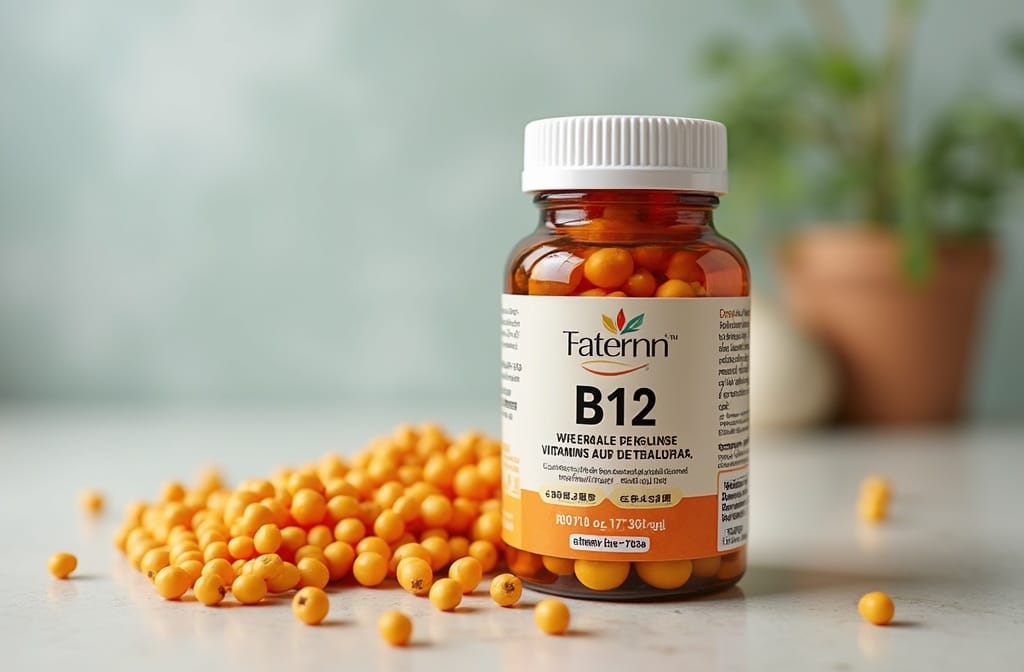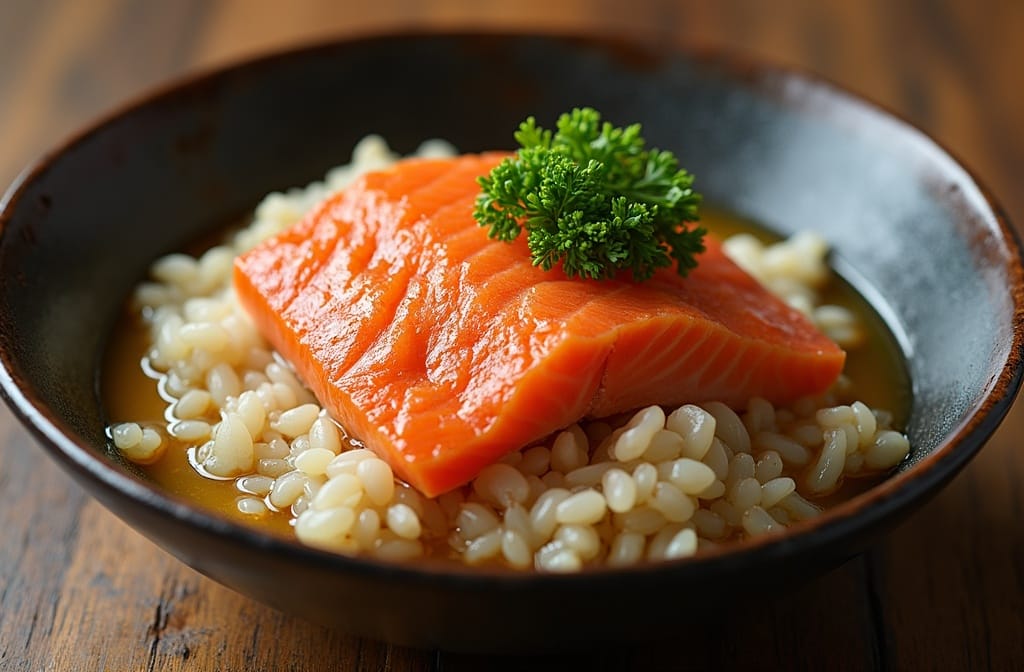- Vitazen Health
- Posts
- 💪 Most Adults Over 55 Are Low On This One Nutrient
💪 Most Adults Over 55 Are Low On This One Nutrient
And it's directly linked to fatigue, anxiety, and poor sleep.

Hello Everyone - Welcome to Vitazen Health!
In Today’s Edition:
Read It: Most Adults Over 55 Are Low On This One Nutrient
In The News: Weekend Warriors Rejoice: Cramming Exercise Pays Off
Eat: Salmon Ochazuke with Brown Rice and Miso Broth
Watch: The WORST Food That FEEDS Cancer Cells & New Way To STARVE Disease | Dr. Jason Fung


READ IT
The game, as they say, changes. It doesn't evolve. It mutates. Like a virus, time rewrites the code, and what was once a given becomes a liability. We spend our youth chasing peaks, ignoring the valleys. We think strength is a constant, a birthright.
It isn't. It's a lease, and the rent is due.
For most adults over 55, that rent often comes due in the form of the quiet, insidious deficiency of Vitamin B12.
We're not talking about some fringe supplement pushed by wellness gurus. This is bedrock biology. B12 is essential for nerve function, red blood cell formation, and DNA synthesis. It’s the engine oil of your nervous system. Without it, the engine sputters.
The problem? Absorption. As we age, our stomach acid—the primary catalyst for B12 extraction from food—diminishes. This is compounded by common medications, like proton pump inhibitors for heartburn, which further reduce acid production. Add to that the prevalence of atrophic gastritis, a condition where the stomach lining thins, and you've got a perfect storm for B12 depletion.
The symptoms? They’re subtle and can be attributed to normal symptoms of aging. Fatigue. Brain fog. Numbness or tingling in the extremities. Memory lapses. Things you chalk up to "getting old." But they’re not inevitable. They’re indicators. Red flags.
This isn’t about chasing some mythical fountain of youth. It’s about maintaining operational capacity. It’s about extending the runway.
The Data Doesn’t Lie
Studies consistently show a significant prevalence of B12 deficiency in older adults. An article published by Cleveland Clinic highlighted that over 4% of adults aged 40 to 59 are deficient. This deficiency then becomes more prevalent by the age of 60.
This isn't a statistical anomaly. It's a systemic issue.
The Actionable Advice
Get Tested: Don’t guess. Don’t assume. A simple blood test can reveal your B12 levels. Ask your doctor for a serum B12 test and, ideally, a methylmalonic acid (MMA) test, which is a more sensitive indicator of deficiency.
Supplement Strategically: If you’re deficient, oral supplements are often sufficient. Look for methylcobalamin or adenosylcobalamin, more bioavailable forms. Sublingual options can bypass some absorption issues. For severe deficiencies, injections might be necessary.
Dietary Awareness: Prioritize B12-rich foods. Animal products are the primary source: meat, fish, eggs, dairy. If you’re vegan or vegetarian, you need to supplement. Period. Nutritional yeast is a vegan food that is sometimes fortified with B12.
Gut Health Matters: Optimize your gut. Address underlying issues like gastritis. Consider probiotics and prebiotics to support healthy gut flora.
Medication Review: If you're on long-term medications, especially proton pump inhibitors or metformin, discuss potential B12 interactions with your doctor.
Monitor Symptoms: Pay attention to those subtle shifts. Fatigue that doesn’t lift. Tingling that lingers. Don’t dismiss them. They’re signals.
This isn’t about living forever. It’s about living well. It’s about maintaining the sharpness, the clarity, the vitality that allows you to engage with life on your own terms.
We’re not built for stasis. We’re built for adaptation. And adaptation requires fuel. B12 is that fuel.
The world doesn’t care about your excuses. It demands performance. And performance, at any age, starts with the fundamentals.
Don’t let a simple deficiency rob you of your potential. Control the variables you can. Optimize the systems. Extend the runway.
Because the game, as you know, changes. But how you play it? That’s still your choice.

Authentic Matcha, Elevated Wellness
With global demand soaring, genuine, organic Japanese matcha is harder to find than ever. Yu Tea remains committed to purity and authenticity, offering the highest grade matcha exclusively from small, organic Japanese farms.
Discover why Yu Tea's ceremonial matcha stands apart:
Certified 100% Organic, non-GMO, and ISO 22000 verified
Gentle yet uplifting energy—no jitters, just clarity
Rich in antioxidants for enhanced cellular health
Naturally detoxifying for a refreshed, balanced body
Decaf option available for sensitive caffeine users
Hurry—secure your premium organic matcha today!
Exclusive Offer: Enjoy 20% off your first order.


IN THE NEWS
Weekend Warriors Rejoice: Cramming Exercise Pays Off
A recent study from Southern Medical University in Guangzhou suggests that "weekend warriors"—those who condense their workouts into one or two days—can reap similar health benefits to regular exercisers. Analyzing data from over 93,000 UK adults, researchers found that logging at least 150 minutes of moderate to vigorous activity weekly reduced cardiovascular disease mortality by 30% and cancer mortality by 20%. Surprisingly, these benefits were even more pronounced than those seen in daily exercisers.
Shingles Vaccine: A Shot at Lower Dementia Risk
Stanford Medicine's latest research indicates that seniors receiving the shingles vaccine may have a 20% lower risk of developing dementia over seven years. By analyzing health records of over 280,000 individuals in Wales, the study suggests that preventing varicella-zoster virus reactivation could reduce neuroinflammation linked to cognitive decline. These findings align with previous studies hinting at vaccines' potential role in dementia prevention.
Life Expectancy Set to Climb Despite Global Challenges
The Global Burden of Disease Study 2021 forecasts a 4.5-year increase in global life expectancy by 2050, rising from 73.6 to 78.1 years. Notably, countries with currently lower life expectancies are expected to see the most significant gains, narrowing global disparities. This positive trend is largely attributed to public health measures improving survival rates from cardiovascular diseases and other conditions.

🔥 INFLAMMATION = DISEASE. HERE’S HOW TO FIX IT.
If you’re tired, bloated, foggy, or in constant pain—that’s inflammation wrecking your body.
And if you don’t stop it, it leads to cancer, heart disease, and aging you faster than you realize.
Most people have no clue that what they’re eating is keeping them inflamed 24/7.
But here’s the good news: you can fight inflammation with food.
🥤 The Anti-Inflammation & Immunity Smoothie & Juice Guide gives you 80+ science-backed recipes to:
✅ Turn OFF inflammation naturally (no gimmicks, just real food that works)
✅ Boost immunity so you stop getting sick all the time
✅ Detox & repair your gut (because 80% of your immune system lives there)
✅ Flood your body with antioxidants that protect against cancer & disease
This isn’t another “healthy smoothie” book.
It’s a plug-and-play blueprint for fixing your body one sip at a time.
👉Grab your copy now & start healing today!

EAT
Salmon Ochazuke with Brown Rice and Miso Broth (2 Servings)
Japanese cuisine is a harmonious blend of simplicity, seasonality, and artistry. The salmon ochazuke with brown rice and miso broth offers a comforting blend of savory and umami flavors, centered around flaky salmon and a warm, nourishing miso broth. It's a modern take on a classic Japanese comfort food, designed to be both delicious and healthy.

Ingredients
Salmon:
2 fillets (about 6 oz each) of skin-on salmon, preferably wild-caught
1 tbsp sesame oil
Pinch of sea salt
Freshly ground black pepper
Brown Rice:
1 cup short-grain brown rice, cooked according to package directions
Miso Broth:
4 cups dashi (Japanese fish stock, or vegetable dashi for a vegetarian option)
2 tbsp white miso paste
1 tbsp mirin
1 tsp grated ginger
1 spring onion, thinly sliced, for garnish
1/2 sheet of nori seaweed cut into thin strips
Toppings (Optional):
Sesame seeds
Shiso leaves, thinly sliced
Wasabi paste
Recipe Steps
Prepare the Salmon: Preheat your oven to 400°F (200°C). Pat the salmon fillets dry with paper towels. Season with salt and pepper. Heat the sesame oil in an oven-safe skillet over medium-high heat. Sear the salmon, skin-side down, for 3-4 minutes until the skin is crispy. Flip and cook for another 2-3 minutes until just cooked through. Transfer the skillet to the oven and bake for an additional 2-3 minutes to ensure the salmon is flaky. Remove from oven and set aside.
Make the Miso Broth: In a medium saucepan, bring the dashi to a simmer. Reduce the heat to low. In a small bowl, whisk the miso paste with a little bit of the hot dashi until smooth. Stir the miso mixture into the saucepan. Add the mirin and grated ginger. Do not boil the broth after adding the miso, as it can alter the flavor. Keep the broth warm.
Assemble the Ochazuke: Divide the cooked brown rice between two bowls. Flake the cooked salmon over the rice. Pour the warm miso broth over the salmon and rice.
Garnish and Serve: Garnish with sliced spring onion, nori strips, sesame seeds, and shiso leaves (if using). Serve immediately. You may add a small dab of wasabi to the side of the bowl if desired.
Nutritional Notes
This recipe emphasizes whole foods like brown rice and salmon, providing fiber, protein, and omega-3 fatty acids.
Miso adds umami flavor and probiotics, supporting gut health.
Dashi provides a light and flavorful broth base.
This can be easily modified to be vegetarian by using vegetable dashi.
This recipe can even include other healthy additions such as edamame, or other types of cooked vegetables.

WATCH
In this video, we will highlight the five worst foods that feed cancer cells, as studied and recommended by Dr. Jason Fung. Excluding these foods from our diet can potentially decrease the risk of cancer and give us an additional line of defense against this chronic disease. This underscores the importance and effects of diet on our overall health. And that’s just the beginning. By the end of the video, we will also share Dr. Fung’s secret and unique strategy for reducing the risk of cancer. So stay tuned with us until the end.

Thank You For Reading!
Someone send you this email? Sign up here & get a FREE 7-Day Anti-Cancer Meal Plan
Checkout our YouTube channel for more info on how your diet can improve your health
What did you think of today's email? |




Reply